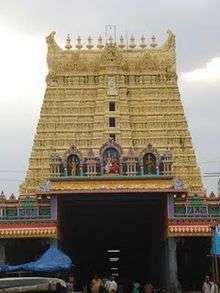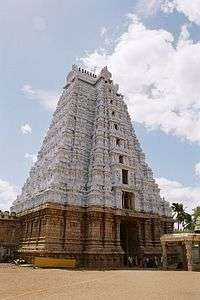Sankaranayinarkoil
Sankaranarayanarkoil is a town and a municipality in the Tenkasi district of the Indian state of Tamil Nadu.
The temple

Sankarankovil is home to the famous Sankara Narayanan temple. It is situated at Tenkasi district and 41 km away from Tenkasi City. Sankarankovil is the second largest town in the district. It is very famous for "Adi Thabasu" festival. In older times, the city was called as Sankaranayinar kovil. Even now it is called as Sankaran Kovil.
Like every other temple, Sankarankovil has its own interesting story. Once the devotees of Lord Hari (or Vishnu) and Lord Shiva quarreled with each other to determine whose god is powerful. Then Lord Shiva and vishnu appeared as Sankaranarayanar to make there devotees to understand that both Hari and Shiva are one and the same.
It was built by Ukkira Pandiyan AC 900. It houses the deity by the name Sankara Narayanan, which is half - Lord Shiva and the other half - Lord Vishnu.
The deities of this temple are Sri Sankareswarar, Sri Gomathi Amman and Sri Sankara Narayanar. Sankarankovil is also said to be home to the deity named Avudai Ambal-RR.
The general belief is that the Holy Sand "Puttrumann" (Puttru = Ant Hill, Mann = Sand) that one gets from this temple is capable of curing all the diseases. Devotees believe that Sankarankovil's Nagasunai (sacred tank) have been dug by serpent kings named Paduman and Sangam which has a miraculous power to heal those who bathe there. The Annadhanam scheme is being conducted in the temple when daily noon meals are being provided for around 100 devotees.
The Puthu Maan in the temple is taken as a holy sand which could cure lot of disease by all devotees.
It is believed that all devotees who pray to the goddess Gomathi amman have always found solace.
History
Once upon a time a "Devan" (Angel) called "Manikkeerivan" was cursed by Goddess Parvathi. Because of which, he had to come to earth and work as gardener in a beautiful garden. One day while he was clearing a snake pit, the snake tail was also cut. He found a Sivalingam next to the snake. He went and informed about this to his king Ukkira Pandiyan. The king considered it to be the god's wish to stay there and constructed the temple and a city around.
The snake pit (Ant Hill) is called "Vanmeekam" (Tamil: வன்மீகம்). Hence the deity Sri Sankaralingar is also called "Vanmeeganadhar" (Tamil: வன்மீகநாதர்).
Demographics
- As of 2011 India census,[1] Sankarankovil had a population of 70, 574
- Males constitute 50% of the population and females 50%.
- Sankarankovil has an average literacy rate of 68%, higher than the national average of 59.5%: male literacy is 77%, and female literacy is 60%.
- In Sankarankovil, 11% of the population is under 6 years of age.
Festivals
- Chithhirai Bramotsava ( 10 days ) Every April
- Adi Thapasu festival ( 12 days ) August
- Iyppasi Thirukkalyanam festival ( 10 days ) October
- Theppam floating festival - Thai last Friday ( Every February )
Thiru Kotti Ayyanar Temple Festival
The great Thiru Kotti Ayyanar Temple is situated near Sankarankovil. Sankaranarayan Temple is completely linked with the activities of this temple. In the Tamil month of Masi people from all over Tamil Nadu will visit here and get the Tharshan of the great Thiru Kotti Ayyanar. The great power of this god is whenever you calling him in tough times you can able to understand any gesture and your problem will be solved after the gesture. It is exactly 6 km from Sankarankovil. At one time the temple is own property of Kalappakulam village and the great story is there.
References
- "Census of India 2001: Data from the 2011 Census, including cities, villages and towns (Provisional)". Census Commission of India. Archived from the original on 16 June 2004. Retrieved 1 November 2008.
